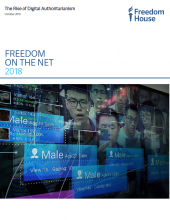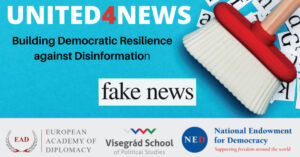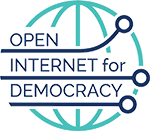Thankfully, we are on the cusp of “Web3,” a next-generation Internet that for two reasons could turn out to be revolutionary by shifting power back to individual users and offer a pivotal advantage in the ongoing competition with authoritarian states, they write for The Washington Post:
- First, authoritarian states cannot abide private life because that’s where anti-governmental activities can percolate. China and Russia have already set up mechanisms to spy on and control the existing Web2 infrastructure through firewalls, censorship and coercion of technology platforms. Web3 would make such authoritarian controls much more difficult.
- Second, although the United States still dominates Web2 in many ways, the Web’s current framework allows China to sweep up swaths of data to power its political and military artificial intelligence systems. The decentralization and personal data control of Web3 would make it much harder for China to maintain data dominance. RTWT
Anthony Vinci is an adjunct senior fellow at the Center for a New American Security. National Endowment for Democracy (NED) board member Nadia Schadlow is a fellow at the Hudson Institute and Hoover Institution.
 Citizen Lab’s Ron Deibert describes the offerings of the lucrative private spyware industry as “a new kind of ‘despotism-as-a-service,’ enabling buyers to reach across borders and undermine their adversaries,” in the latest issue of Digital Directions, from the International Forum for Democratic Studies at the National Endowment for Democracy:
Citizen Lab’s Ron Deibert describes the offerings of the lucrative private spyware industry as “a new kind of ‘despotism-as-a-service,’ enabling buyers to reach across borders and undermine their adversaries,” in the latest issue of Digital Directions, from the International Forum for Democratic Studies at the National Endowment for Democracy:
While some authoritarian states that are pioneering and exporting their own comprehensive paradigms of digital repression, illiberal actors worldwide are also expertly leveraging the power and vulnerabilities of Western tech platforms to gather information, shape perceptions, and target critics. Critically, they are bolstering their repressive capacities using hardware and surveillance tools produced in democracies. Thus far, export control regimes have failed to keep pace with the challenge of “contain[ing] technologies that can enable human rights abuses.” READ MORE
Ukrainian special forces planning so-called “false flag” operations, the U.S. considering chemical weapons attacks, NATO preparing to attack Russia during the Winter Olympics……
The Kremlin is ratcheting up its disinformation game with claims like these amid rising geopolitical tensions between Moscow and Western capitals, according to a review of state-backed media content by POLITICO.
 “Where they really are moving the needle is on undermining support for U.S. internationalism,” said Bret Schafer, head of the information manipulation team at the German Marshall Fund’s Alliance for Securing Democracy. “Russia state media messaging is more effective at chipping away at the West’s geopolitical goals than it is in dividing the West because we do that well enough on our own,” he added.
“Where they really are moving the needle is on undermining support for U.S. internationalism,” said Bret Schafer, head of the information manipulation team at the German Marshall Fund’s Alliance for Securing Democracy. “Russia state media messaging is more effective at chipping away at the West’s geopolitical goals than it is in dividing the West because we do that well enough on our own,” he added.
The U.S. State Department published a “cheat sheet” seeking to explain the Kremlin’s online falsehoods, while the European Union’s East Stratcom team also highlighted the Kremlin’s tactics.
Marshall McLuhan and others predicted the rise of “fifth generation warfare” as far back as the 1970s, and now we are seeing social media provide the “perfect storm” of disinformation, with deadly consequences around the world, Princeton’s Center for Information Technology Policy adds.
 CITP Seminar: Disinformation and Its Threat to Democracy. Speaker: Danny Rogers, co-founder and CTO of the Global Disinformation Index. February 1, 2022, 12:30 PM EST. RSVP
CITP Seminar: Disinformation and Its Threat to Democracy. Speaker: Danny Rogers, co-founder and CTO of the Global Disinformation Index. February 1, 2022, 12:30 PM EST. RSVP
How can AI tools help detect “deep fakes” and other forms of coordinated inauthentic behavior online? How can democratic policymakers and social media companies counter the threat of disinformation and online extremism without impinging on freedom of speech and other fundamental freedoms? What are the most effective techniques for educating citizens to the threat of disinformation, and developing counter-narratives to combat conspiracy theories? The Yale Cyber Leadership Forum asks.
This year’s Yale Cyber Leadership Forum, Bridging the Divide: National Security Implications of Artificial Intelligence, will bring together attorneys, technologists, entrepreneurs, policymakers, and academics to explore explore how advances in AI have the potential to dramatically alter the cybersecurity threat landscape.
Disinformation and the Future of Democracy. Friday, March 4, 2022 9:00 AM – 12:00 PM. Other Friday sessions will be held from 9:00 a.m. to 1:00 p.m. EST on February 18 and April 1. RSVP


 The Internet once held great promise as a means of empowering individuals, but it has become yet another path of control for bad actors, note analysts Anthony Vinci and
The Internet once held great promise as a means of empowering individuals, but it has become yet another path of control for bad actors, note analysts Anthony Vinci and 





